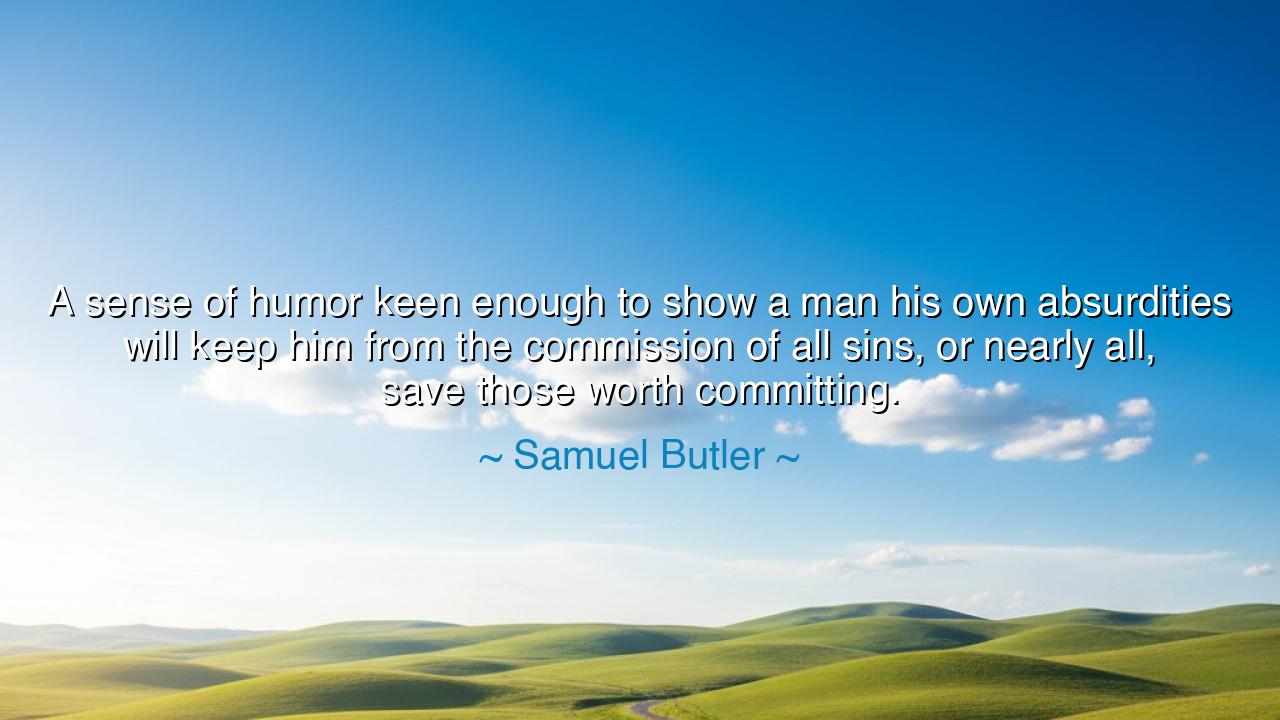
A sense of humor keen enough to show a man his own absurdities
A sense of humor keen enough to show a man his own absurdities will keep him from the commission of all sins, or nearly all, save those worth committing.






In the words of Samuel Butler, the sharp and witty thinker of the nineteenth century, we are offered a truth that gleams like a mirror held to the soul: “A sense of humor keen enough to show a man his own absurdities will keep him from the commission of all sins, or nearly all, save those worth committing.” Though cloaked in jest, this saying carries the weight of moral wisdom. It teaches that to see oneself clearly — to perceive one’s own follies with laughter instead of pride — is to attain a form of inner freedom. For the man who can laugh at himself is armored against vanity, arrogance, and deceit. He is, in a way, incorruptible, for his humor keeps his ego humble and his spirit awake.
In this quote, Butler — a writer known for his irony and philosophical insight — speaks to a law as old as human folly itself. From the earliest days, man has been prone to take himself too seriously, to clothe his errors in self-importance and call them virtue. Yet humor, that divine spark of recognition, tears away the mask and reveals the smallness beneath. When one learns to laugh at one’s own absurdities, one becomes wise, for laughter is the mind’s way of acknowledging truth without despair. It is the light that exposes the shadow but refuses to fear it. Such laughter, Butler says, is a safeguard — a guide that keeps us from committing all sins, except perhaps those born of love, passion, or courage — the “sins worth committing.”
The ancients, too, understood this sacred power of humor. The philosopher Socrates, master of wisdom and irony, wielded laughter as both shield and sword. In his dialogues, he feigned ignorance to expose the arrogance of others — but always with a twinkle of mirth. His humor was not mockery, but medicine; it cured men of false certainty. When asked by the Oracle of Delphi who was the wisest of men, Socrates laughed, knowing that his wisdom lay only in admitting his ignorance. Thus, his irony saved him from the greatest sin of all — the sin of self-deception. In his laughter lived humility, and in his humility, virtue.
The sense of humor that Butler describes is therefore not the coarse jest or the cruel mockery of others; it is the noble art of turning one’s laughter inward. It is to look upon one’s anger, greed, or vanity and say, “Ah, there you are again, old friend,” and in that smile, dissolve their power. Such self-awareness prevents the spirit from hardening. For the man who never laughs at himself becomes a tyrant — to others and to his own soul. History is filled with such figures: kings, priests, and ideologues who believed themselves beyond absurdity. They silenced laughter, and in so doing, silenced truth.
Consider, by contrast, Abraham Lincoln, who bore the weight of war and sorrow yet carried within him a humor as keen as Butler’s own. When accused by his rivals of being two-faced, Lincoln smiled and said, “If I had another face, do you think I’d be wearing this one?” His wit was not vanity but humility — the mark of a man who could see his imperfections and still move forward with grace. It was his laughter, as much as his leadership, that kept him human amid the horror of history. Such humor, born of wisdom and compassion, guards against despair. It keeps one anchored in truth while still allowing the heart to hope.
Butler’s final words — “save those sins worth committing” — remind us that not all transgressions are evil. There are acts that defy convention but honor the soul: the courage to love recklessly, to speak the truth when silence is safer, to follow conscience over comfort. Such “sins” are the very ones that give life meaning. The man who has learned to laugh at his own absurdities knows that perfection is an illusion. He does not chase it; instead, he lives sincerely, boldly, with joy untainted by fear of failure. His laughter frees him to live deeply, and to err beautifully.
So let this teaching be heard: cultivate a sense of humor as you would a garden of wisdom. Laugh, not at others, but at yourself — your vanity, your blunders, your small ambitions. Let that laughter purify you. When anger burns, let humor cool it; when pride rises, let laughter humble it. For a soul that can see its own foolishness is immune to hypocrisy, and a heart that can laugh remains light, even under the weight of life.
In the end, Samuel Butler gives us not just wit, but a philosophy for living. He tells us that to laugh at oneself is not to belittle the self, but to liberate it. Humor is the soul’s mirror — clear, honest, and kind. It keeps us from becoming monsters of seriousness and reminds us that, beneath all our striving, we are fragile, foolish, and gloriously human. So laugh often — for laughter is not the enemy of virtue, but its guardian, its companion, and its everlasting grace.






AAdministratorAdministrator
Welcome, honored guests. Please leave a comment, we will respond soon